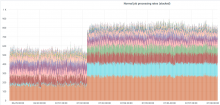We have some anecdodal evidence that recently indexing of new Items in the search index on Wikidata takes longer - in the order of 10 to 15 minutes. Do we have any stats to confirm this?
In the past we have added special handling to get newly created Items added to the search index fast. This was done because the search index powers the entity selector for making new statements. The workflow of creating a new Item and then immediately wanting to select that Item as the value of a new statement is frequent and hindered by a large lack. (It's still possible to add the value by using the Item's ID but it's not great.)

